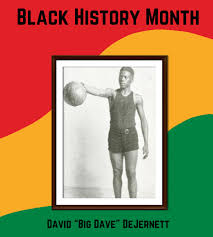The Forgotten Foundation: How David “Big Dave” DeJernett Built Indiana Basketball Before It Was Ready to Claim Him
When the story of Indiana basketball is told, it’s usually a grand symphony of tradition, triumph, and championship banners. Names like Isiah Thomas, Bob Knight, Calbert Cheaney, and Branch McCracken are immortalized in echoes of Assembly Hall. The Hoosier legacy is spoken of with reverence, as if the game itself was born somewhere between the red-bricked arenas and echoing gymnasiums of the Midwest.
But what if we told you that before all of them—before the cheering crowds, the March Madness moments, and the national acclaim—there was a man who laid the cornerstone?
His name was David “Big Dave” DeJernett, and somehow, his story has nearly vanished.
An Athlete Born Before His Time
David DeJernett wasn’t just good at basketball—he was revolutionary. Born in 1912 in Indiana, he rose to prominence during a time when America was still unwilling to let Black athletes shine on the same stage as their white counterparts. Despite towering racial barriers, DeJernett carved his name into Indiana sports history with a chisel made of determination, skill, and defiance.
At a commanding 6-foot-4, DeJernett dominated Indiana high school basketball and led his team at Washington High School to state prominence. He went on to star at Indiana Central College (now the University of Indianapolis), where he broke color barriers to become one of the first Black players in Indiana collegiate basketball—and, arguably, one of the finest.
At a time when most major programs, including Indiana University, excluded Black players, DeJernett made history elsewhere, refusing to be denied the right to play the game he loved.
The Trailblazer That History Forgot
Though he didn’t wear the crimson and cream of the Indiana Hoosiers, DeJernett carried the spirit of Indiana basketball far and wide. In the pre-NBA era, he became a star on all-Black professional teams like the New York Renaissance (Rens) and Chicago Crusaders, competing against—and often beating—the best white teams in the country.
These weren’t just exhibition games; they were acts of resistance. DeJernett wasn’t just dunking basketballs—he was shattering assumptions and challenging Jim Crow with every jump shot.
In an era when newspapers barely acknowledged Black athletes, DeJernett’s name appeared in headlines for his fearless play and magnetic presence. Yet, decades later, even in his home state, his contributions have been relegated to footnotes.
Why?
Because David DeJernett came before the world was ready to give him his due.
A Warrior On and Off the Court
DeJernett’s heroism extended far beyond the hardwood. During World War II, he served in the U.S. Army, earning four Bronze Battle Stars across the European theater. He was not just a legend in sneakers—he was a decorated veteran, a man who bled for a country that hadn’t yet welcomed him fully as an equal.
After the war, DeJernett lived a modest life, away from the limelight he so richly deserved. He passed away in 1964 at the age of 52, decades before the NBA integrated Black superstars, and before Indiana’s basketball culture began to honor the diversity of its roots.
His greatness came too early for the world to fully recognize—but it was greatness, nonetheless.
A Legacy Worth Reclaiming
In 1976, DeJernett was posthumously inducted into the Indiana Basketball Hall of Fame, a long-overdue recognition. But ask most fans today—at Assembly Hall, in sports bars, or even among Hoosier historians—and few will know his name.
That silence is its own kind of injustice.
DeJernett didn’t get to see the Fab Five, didn’t get to witness Oscar Robertson dominate the NBA, or watch modern stars like Victor Oladipo and Trayce Jackson-Davis take up the Indiana banner. But his story made theirs possible.
Every layup in Indiana’s storied history should echo with his footsteps.
More Than a Name—A Movement
David “Big Dave” DeJernett didn’t have a jersey hanging from the rafters. He didn’t play on ESPN. But he made it possible for others to dream bigger, jump higher, and belong—even when the world told him otherwise.
It’s time we tell his story loudly. It’s time to remember that before there were statues, there were sacrifices.
And before there was glory, there was David DeJernett.























